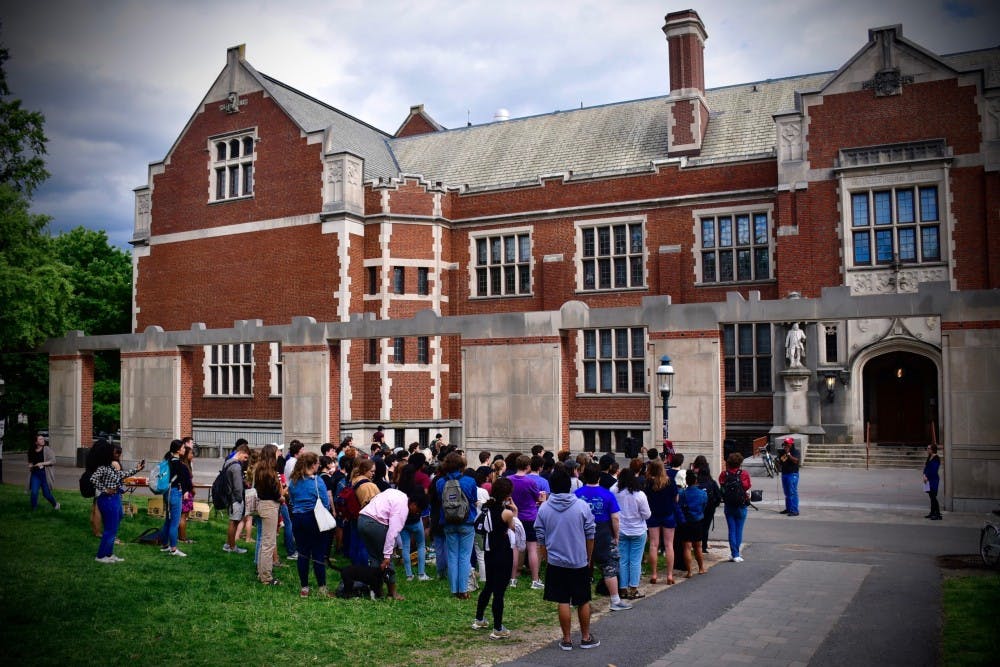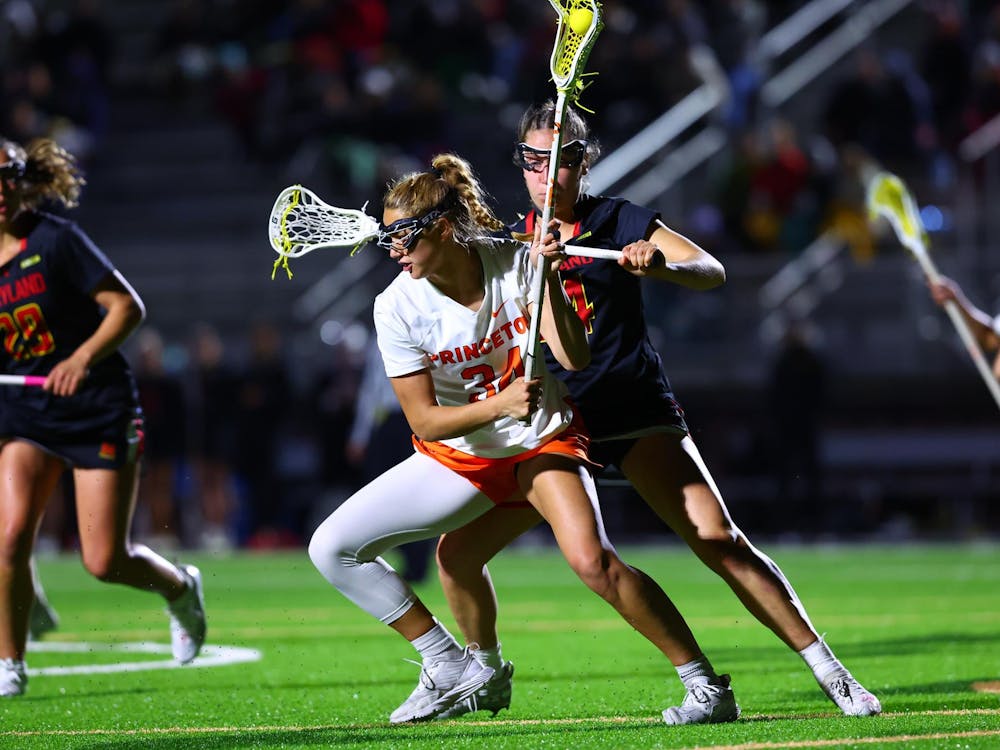On Monday, May 6, approximately 100 students chanting “Ban the box!” walked out from a meeting of the Council of the Princeton University Community (CPUC) in a protest led by Students for Prison Education and Reform (SPEAR).
The “Ban the Box” movement seeks to eliminate the conviction history question on undergraduate student applications for admission to the University. On campus, the campaign has been largely directed by SPEAR. The University is now considering adding a variation of “the box” to the graduate student application as well.
Fifteen minutes into the meeting, the crowd of students left Betts Auditorium, where the CPUC meeting was taking place, and walked to an outdoor area in front of Frist Campus Center, where they listened to two speakers — Dameon Stackhouse, a formerly incarcerated activist, and Dannelle Gutarra Cordero, a University writing program lecturer.
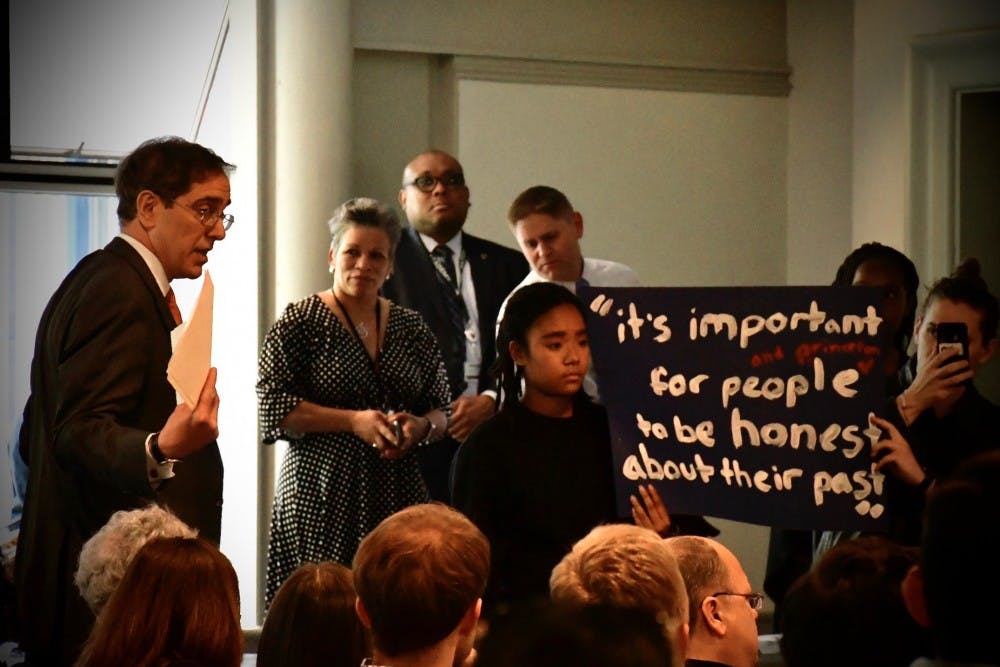
Eisgruber interacts with Ban the Box protestors at a CPUC meeting.
Jon Ort / The Daily Princetonian
Several students participating in the walkout received warnings of potential disciplinary action, removal from the site, and arrest from Associate Dean of Undergraduate Students Jarrett Fisher after they refused to move from the front of the auditorium. The students were warned that it is regulation for protestors to remain in the back of University events.
Amanda Eisenhour ’21, one of the co-presidents of SPEAR, said the protest was a culmination of five years of organizing.
“The University, instead of engaging seriously with our demands, doubled down on the use of the unjust criminal punishment system by reinstating the question about the conviction history on the graduate school application, and by making adjustments to the undergraduate application questions that not only do nothing to mitigate the deterrent effect, but actively reinforce a false and inconsistent binary between misdemeanors and felonies,” she wrote in an email statement to The Daily Princetonian.
In an email statement to the ‘Prince,’ University spokesperson Ben Chang said, “The University takes seriously its mission to support the free expression of all views, and we absolutely support and defend the right of students to participate in peaceful protest activities such as those at the CPUC and the teach-in.”
He deferred the rest of his comments to Dean of the College Jill Dolan’s statements to the ‘Prince’ and to statements made by President Christopher Eisgruber ’83 at the CPUC meeting.
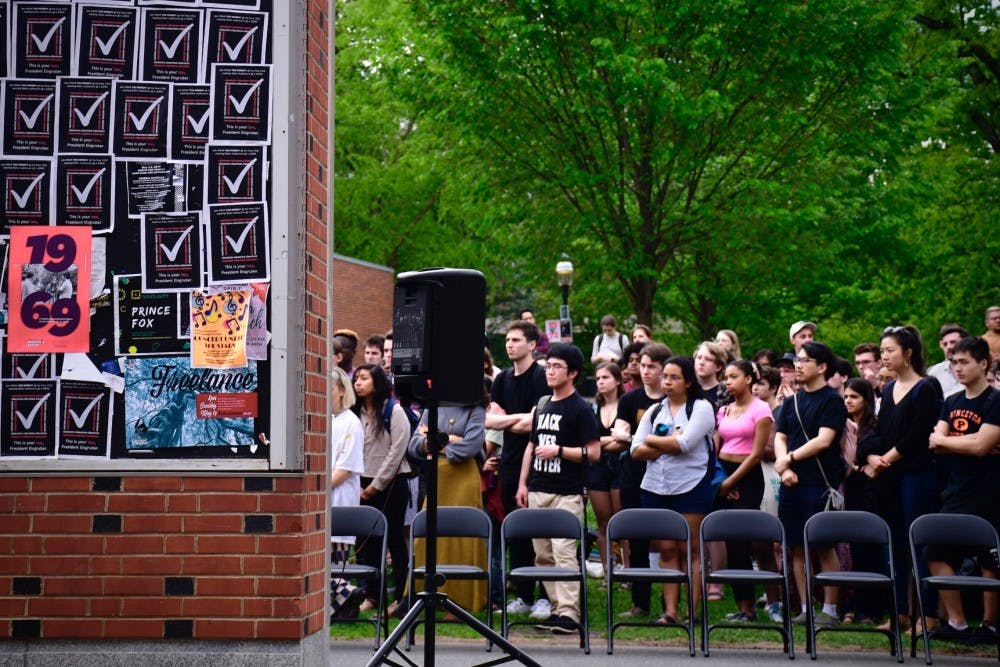

According to the event’s Facebook description, the purpose of the walkout and teach-in was to “[s]how the administration that we are NOT backing down.”
“[T]he question about conviction history on our application relies on a racist, classist system and further silences the voices of one of the most marginalized communities by deterring them from applying to our institution,” read the event description.
Stackhouse spoke of the disadvantages that “the box” brought upon him when he applied for jobs and internships after completing his prison sentence. He emphasized the importance of fighting for change on the issue.
“Rules can be changed. Rules will be changed,” he said. “But we need collective efficacy to make sure that it happens.”
Stackhouse expressed support for causes ranging from stronger, well-balanced education within prisons to increased opportunities for formerly incarcerated individuals.
“There has never been a movement that didn’t cause a problem,” said Stackhouse, before concluding by thanking the group for their support.
Following Stackhouse’s speech, Gutarra Cordero, whose scholarship focuses on the intellectual history of the Caribbean, discussed pervasive theories of scientific racism and their long-term implications on policing and law-making.
Gutarra Cordero explained that, in the past, criminologists were often taught that “criminals could be identified by their — and I quote — ‘ape-like’ characteristics.”
“The eugenics movement was just as interested in validating a racialized understanding of criminology as it was in controlling narratives about intelligence,” Gutarra Cordero continued.
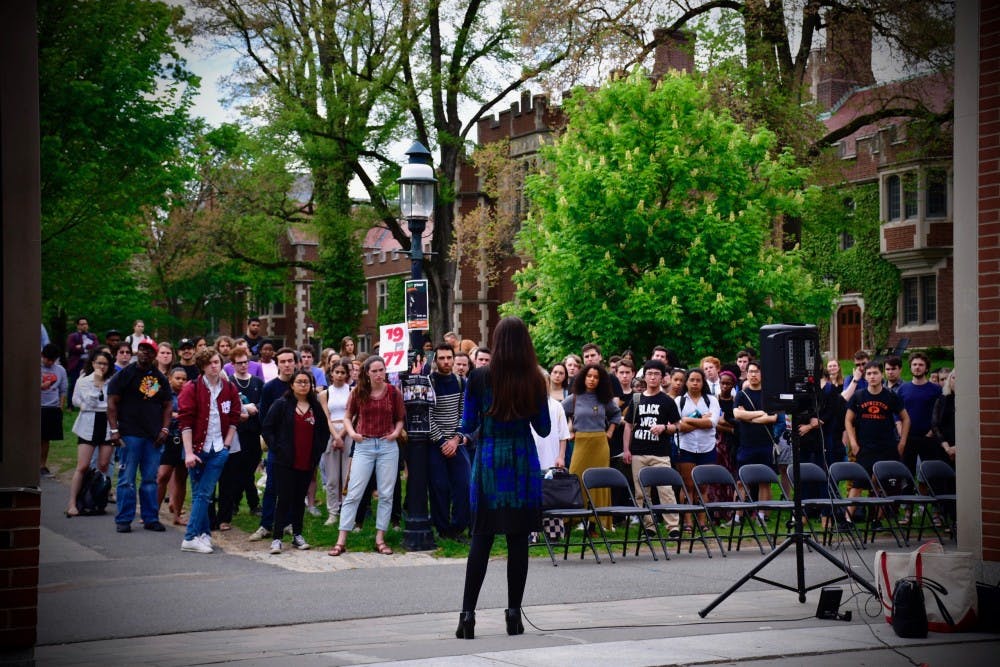
A student protest in 2019.
Jon Ort / The Daily Princetonian
According to Gutarra Cordero, perceived criminality and racism intersected when Carl Campbell Brigham ’1912 GS ’1916, a former University professor whom Gutarra Cordero called a “eugenicist,” created the Scholastic Aptitude Test (SAT). Gutarra Cordero believes the test was intended to be a “premeditatedly biased testing” meant to “safeguard American intelligence.”
Gutarra Cordero followed her explanation of the scientific racism of criminology and the education system by explaining the various ways in which she believes keeping “the box” upholds racialized violence and inequality.
“To keep the box is to enable … the silencing of the voices and the intellectual production of incarcerated and formerly incarcerated individuals,” said Gutarra Cordero.
“While this University was not built for many of us, today Princeton has the opportunity to ban the box and take positions against the forces that oppress us outside and inside the Orange Bubble,” she added, before imagining how an unfairly incarcerated young boy might have been a student in her class this past semester.
Numerous students, both from SPEAR and outside of the organization, gathered for discussion after the two speeches.
“It doesn’t always have to be direct action,” said Kavindya Dalawella ’22, a SPEAR member, after the event. “Just being educated on the issue and being able to talk to other people is important.”
Noam Miller ’21, another SPEAR member, added that there is more to the issue than banning the box, noting that more student action is required to take on the entirety of the prison-industrial complex and the forces that he said work against the underprivileged and communities of color.





